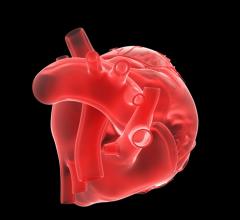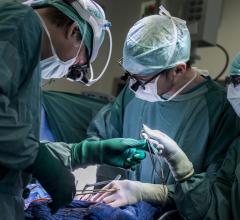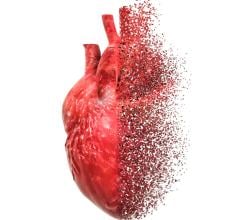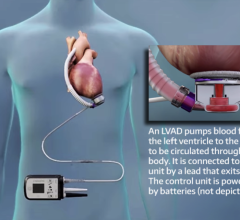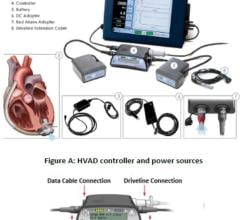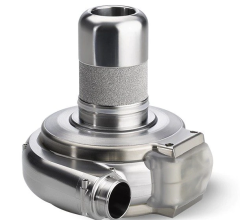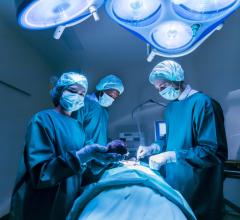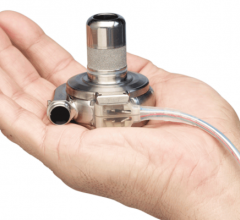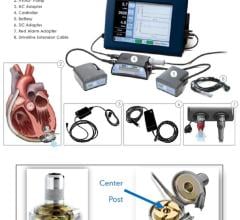
Frank Konjarevich, first U.S. recipient of K-Clip heart failure technology, is examined by Henry Ford Health interventional cardiologist Dr. Pedro Engel Gonzalez during a follow-up visit on Sept. 11 at Henry Ford Hospital in Detroit. Image courtesy of Henry Ford Health
September 15, 2023 — A team of interventional cardiologists from Henry Ford Health’s Center for Structural Heart Disease recently became the first in the United States and the Western Hemisphere to repair a heart valve with severe tricuspid regurgitation in a patient using the investigational K-Clip Transvascular Tricuspid Repair System.
Pedro Engel Gonzalez, M.D., Brian O’Neill, M.D., and William O’Neill, M.D., performed the 60-minute, minimally invasive, nonsurgical procedure through a small incision in the patient’s neck with a catheter to reach the failing heart and placed the K-Clip in a strategic target location around the dilated tricuspid valve. Under the guidance of real-time 3D imaging and 4D modeling, the K-Clip system shrinks the diseased area around the tricuspid valve to help the patient’s valve to function better.
“The K-Clip system is an emerging technology and promising strategy for treating select patients with severe tricuspid regurgitation for whom traditional surgery poses too high of a risk,” said Dr. Engel Gonzalez.
Frank Konjarevich, an 85-year-old retired shoe and handbag repair business owner from the Detroit area, is the first to receive the new technology. “He is one of many patients referred to Henry Ford Health who desperately needed intervention for severe tricuspid regurgitation, who had no other viable options through existing treatments available in the U.S.,” said Dr. Engel Gonzalez.
Tricuspid regurgitation is a type of heart valve disease that occurs when the valve’s flaps no longer close properly. The tricuspid valve controls the flow of blood from the heart’s right atrium (top chamber of the heart) to the right ventricle (bottom chamber of the heart). If left untreated, the condition can lead to an enlarged heart, symptoms of fatigue, abdominal bloating, brain fog, lower extremity swelling, shortness of breath, and ultimately heart failure.
Dee Dee Wang, M.D., director of Structural Heart Imaging at Henry Ford Health, engineered a 3D printed model of Konjarevich’s heart to provide a life-size roadmap to help guide the intraprocedural imaging and precise placement of the K-Clip. The printed model heart was at least three times bigger than a normal heart, a clear sign of the severity of Konjarevich’s condition.
It is estimated that 1.6 million people in the U.S. and 3 million in Europe are living with tricuspid regurgitation which is caused by cardiomyopathies, left-sided heart failure, or lung disease. The five-year survival rate with severe tricuspid regurgitation and heart failure with reduced ejection fraction (HFrEF) is estimated at less than 40 percent.
For a year, Konjarevich had been suffering from progressively worsening shortness of breath, fatigue and lower extremity swelling. Henry Ford physicians discovered Konjarevich had both leaky mitral and tricuspid heart valve issues, which needed to be corrected in sequence.
Normally, the mitral and tricuspid valve would be treated at the same time with open heart surgery, however Konjarevich’s prior heart interventions, medical conditions and weakness made him too high risk for surgery. That is where Henry Ford’s Structural Heart team, specializing in minimally invasive transcatheter heart procedures, stepped up.
“We were able to repair his leaky mitral valve and then searched worldwide for options to treat his leaky tricuspid valve,” said Dr. Brian O’Neill.
“It was a painless procedure, and I was up and around the next morning like nothing ever happened,” said Konjarevich. “The Henry Ford team was remarkable in everything they did for me.”
The K-Clip procedure is performed under general anesthesia and after a few hours from waking up, the patient can be walking around. In Konjarevich’s case, he was able to go home the following day.
“I’m so proud of him to be so brave,” said Diane Tapp, Konjarevich’s daughter. “He is feeling so much better, and his improvement was almost immediately noticeable by family and friends.”
“Mr. Konjarevich’s leaky valve has improved after the K-Clip procedure and the leakage amount has been significantly reduced,” said Dr. William O’Neill. “At Henry Ford Health’s Center for Structural Heart Disease, we do whatever we can to help find solutions for patients with complex heart conditions.”
Tapp hopes her father’s pioneering procedure will help spread the word to others to reach out to Henry Ford Health’s Center for Structural Heart Disease to explore treatment options that may be available for their heart disease.
For more information: https://www.henryford.com/

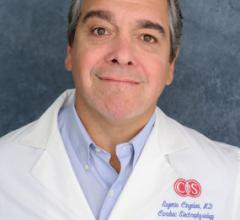
 June 19, 2024
June 19, 2024 
